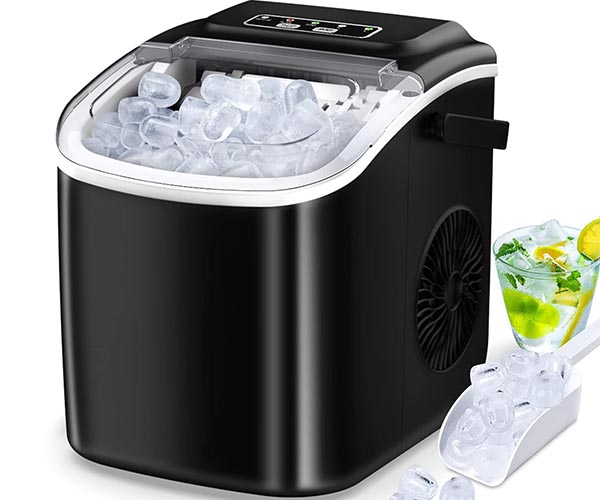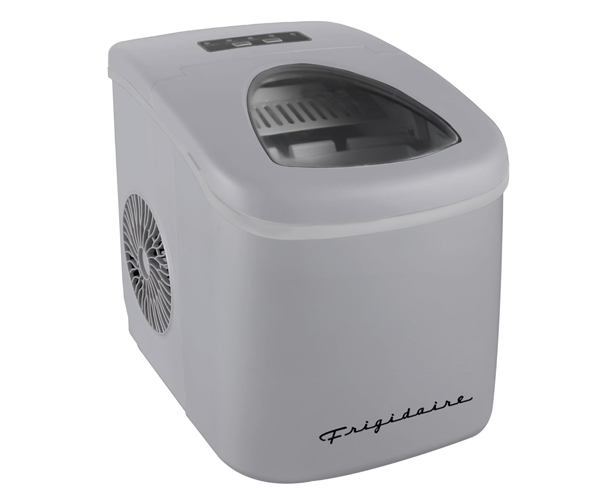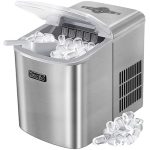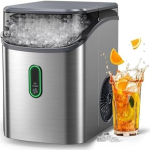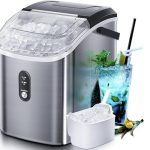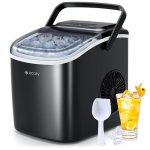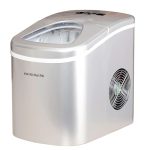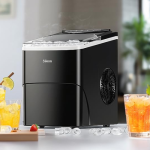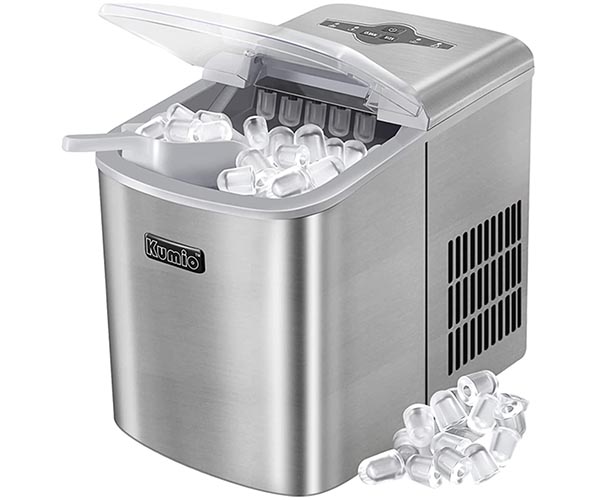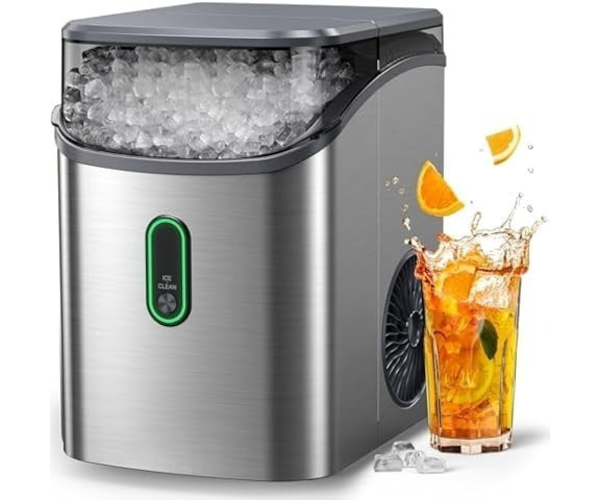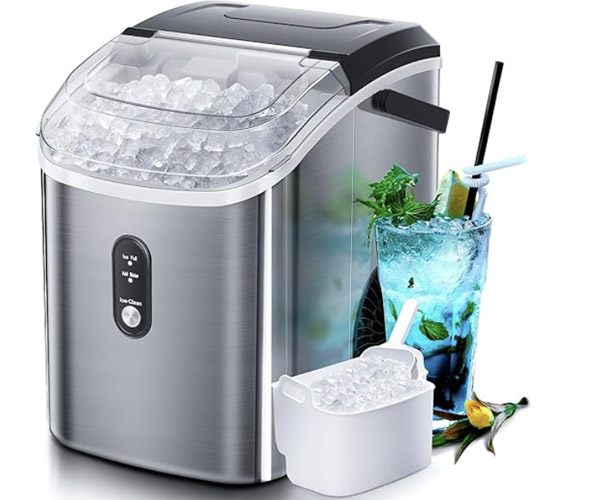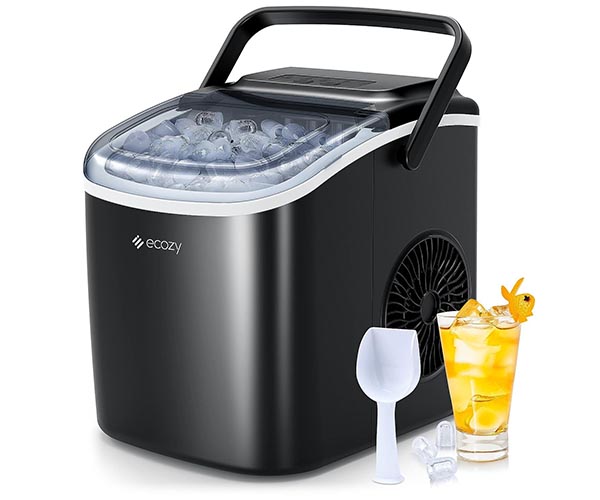Introduction
The longevity of the device and the caliber of the ice it generates both depend on regular cleaning of the ice maker. Ignoring this chore can result in the growth of bacteria, mold, and offensive smells, rendering your ice tasteless and dangerous. We’ll examine the greatest cleaning agents for countertop ice makers in this extensive guide, providing you with useful advice and step-by-step instructions to guarantee your appliance stays in peak working order. Regardless of your level of experience, you’ll discover helpful tips to maintain the proper operation of your ice maker.https://amzn.to/3WoePQf
Understanding Your Ice Maker
Countertop ice makers are a convenient addition to any kitchen, offering quick and efficient ice production without the need for a full-sized machine. To effectively maintain and clean your countertop ice maker, it’s essential to understand the various types available and the components that require regular maintenance.
Types of Countertop Ice Makers
- Nugget Ice Makers:
- Function: Produces chewable, soft ice nuggets perfect for cocktails and soft drinks.
- Cleaning Needs: Regular cleaning of the ice bin and water reservoir to prevent mold and bacteria buildup.
- Bullet Ice Makers:
- Function: Creates cylindrical, hollow ice bullets ideal for general use.
- Cleaning Needs: Clean the ice tray and evaporator rods to ensure optimal performance.
- Cube Ice Makers:
- Function: Produces clear, square ice cubes commonly used in restaurants and bars.
- Cleaning Needs: Focus on the ice mold and water lines to avoid mineral deposits.
- Flake Ice Makers:
- Function: Produces small, flaky ice pieces suitable for seafood displays and medical uses.
- Cleaning Needs: Clean the ice storage bin and the internal auger to maintain hygiene.
Common Materials and Components That Require Cleaning
Understanding the materials and components of your cleaning countertop ice maker is crucial for effective maintenance:
- Water Reservoir:
- Material: Usually made from plastic or stainless steel.
- Cleaning: Regularly flush with a vinegar-water solution to remove mineral deposits and bacteria.
- Ice Tray/Ice Mold:
- Material: Typically silicone or metal.
- Cleaning: Wipe down with a mild detergent and rinse thoroughly to prevent residue buildup.
- Ice Bin:
- Material: Plastic or stainless steel.
- Cleaning: Wash with warm, soapy water and dry completely to avoid mold growth.
- Evaporator Rods:
- Material: Metal, often stainless steel.
- Cleaning: Descale using a specialized cleaning solution to remove calcium buildup.
- Water Lines:
- Material: Flexible plastic tubing.
- Cleaning: Run a cleaning solution through the lines to prevent clogging and contamination.
- Internal Filters:
- Material: Carbon or mesh.
- Cleaning: Replace regularly as per manufacturer guidelines to ensure water purity.
- External Housing:
- Material: Plastic or stainless steel.
- Cleaning: Wipe down with a damp cloth and mild detergent to keep it looking clean and prevent the spread of bacteria.
Regular cleaning of these components ensures that your ice maker functions efficiently and produces clean, safe ice. For best results, establish a routine that includes weekly and monthly cleaning tasks, and always follow the manufacturer’s instructions for your specific model.
By understanding the types of countertop ice makers and their specific cleaning needs, you can maintain a hygienic and efficient machine. This knowledge not only extends the lifespan of your appliance but also ensures that every ice cube produced is as clean and fresh as possible.
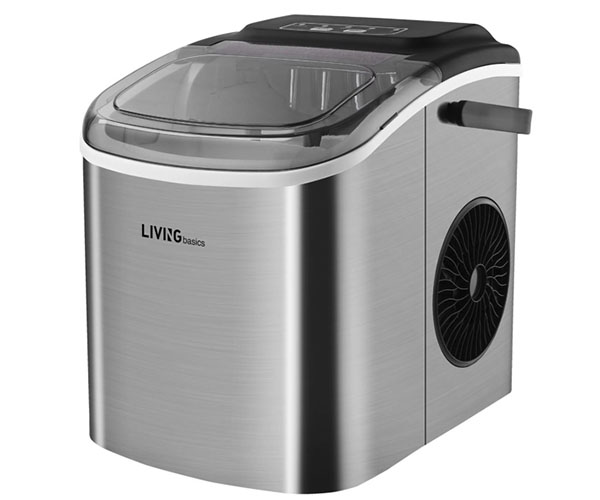
Why Regular Cleaning is Essential
Maintaining a cleaning countertop ice maker is vital not only for the longevity of the appliance but also for ensuring the ice produced is safe for consumption. Regular cleaning plays a crucial role in preventing several health hazards and enhancing the overall performance of the ice maker. https://amzn.to/3WoePQf
Health Implications of a Dirty Ice Maker
A neglected ice maker can become a breeding ground for harmful bacteria, mold, and other pathogens. These contaminants can lead to a variety of health issues, including:
- Foodborne Illnesses: Bacteria such as E. coli and Salmonella can thrive in moist environments, potentially contaminating the ice and leading to serious foodborne illnesses.
- Respiratory Problems: Mold spores from a dirty ice maker can become airborne and cause respiratory issues, especially in individuals with allergies or asthma.
- Gastrointestinal Issues: Consuming ice contaminated with bacteria or mold can cause stomach cramps, diarrhea, and other gastrointestinal disturbances.
Regular cleaning with effective solutions helps eliminate these health risks, ensuring that the ice produced is safe and clean.
Benefits of Regular Maintenance
Keeping your cleaning countertop ice maker in pristine condition offers numerous benefits:
- Longevity of the Appliance: Regular maintenance prevents the build-up of mineral deposits and mold, which can corrode internal components and reduce the lifespan of the ice maker.
- Better Ice Quality: Clean ice makers produce clearer, better-tasting ice. Residual odors and flavors from old ice can affect the quality of new ice, making it unpleasant to use.
- Efficient Performance: A well-maintained ice maker operates more efficiently, producing ice faster and with less energy consumption. This can also prevent common issues such as ice clumps and slow production rates.
- Cost Savings: Regular cleaning and maintenance can prevent costly repairs and extend the appliance’s lifespan, saving you money in the long run.
Key Maintenance Tips:
- Weekly Wipe-Downs: Use a damp cloth to wipe down the exterior and interior surfaces weekly to prevent the build-up of dirt and grime.
- Monthly Deep Clean: Conduct a thorough cleaning at least once a month using either natural or commercial cleaning solutions to remove any accumulated mineral deposits or mold.
- Filter Checks: Regularly inspect and replace the water filter, if your ice maker has one, to ensure clean water is being used for ice production.
By incorporating these regular cleaning routines, you can ensure that your cleaning countertop ice maker remains in top condition, producing high-quality ice for all your needs. This proactive approach not only safeguards your health but also enhances the efficiency and longevity of your appliance, making it a valuable addition to your kitchen for years to come.
Key Takeaways
- Regular cleaning prevents health hazards such as foodborne illnesses and respiratory issues.
- Maintaining a clean ice maker ensures better ice quality and extends the appliance’s lifespan.
- Efficient performance and cost savings are significant benefits of regular maintenance.
- Implementing weekly wipe-downs, monthly deep cleans, and filter checks are essential maintenance practices.
Ensuring your ice maker is regularly cleaned and well-maintained is not just about maintaining appliance efficiency; it’s about ensuring the safety and quality of the ice you consume. By following these guidelines, you can enjoy the full benefits of your cleaning countertop ice maker with peace of mind.
Identifying the Best Cleaning Solutions
When it comes to cleaning your countertop ice maker, choosing between natural and commercial cleaning solutions is crucial. Both types have their advantages and disadvantages, which we will explore in detail to help you make an informed decision.
Natural Cleaning Solutions
Natural cleaning solutions are popular for their safety and eco-friendliness. They often involve common household items like vinegar, lemon juice, and baking soda. Here are the key pros and cons:
Pros:
- Safety: These solutions are non-toxic and safe for both you and the environment.
- Cost-Effective: Most natural cleaning agents are inexpensive and readily available in most households.
- Eco-Friendly: Natural solutions do not contribute to environmental pollution.
- Multi-Purpose: These ingredients can be used for various cleaning tasks around the house.
Cons:
- Effectiveness: They may require more effort and time to achieve the same level of cleanliness as commercial products.
- Odor: Some natural solutions, like vinegar, can leave a strong odor that might be unpleasant.
- Residue: Natural solutions might not rinse away as easily, potentially leaving a residue if not properly cleaned.
Commercial Cleaning Solutions
Commercial cleaning solutions are specifically designed for cleaning appliances like ice makers. They often contain stronger chemicals that are effective in removing tough stains and sanitizing the machine.
Pros:
- Effectiveness: These solutions are highly effective at removing build-up and disinfecting the ice maker, ensuring it operates at peak performance.
- Convenience: They are designed for specific cleaning tasks, making them easy to use with clear instructions.
- Speed: Commercial cleaners often work faster than natural alternatives, saving you time.
Cons:
- Cost: These products can be more expensive compared to natural solutions.
- Chemical Exposure: They contain chemicals that might be harmful if not used correctly, posing a risk to health and safety.
- Environmental Impact: The chemicals in these cleaners can contribute to environmental pollution.
Detailed Steps for Using Natural Cleaning Solutions
Vinegar and Water Mixture
A mixture of vinegar and water is one of the most effective natural cleaning solutions for your countertop ice maker.
Steps:
- Preparation: Unplug your ice maker and remove any ice and water from the reservoir.
- Mixing: Combine equal parts of white vinegar and water in a bowl.
- Application: Using a soft cloth or sponge, apply the solution to all removable parts and the interior surfaces of the ice maker.
- Soaking: For tough stains, let the solution sit for a few minutes before scrubbing.
- Rinsing: Rinse all parts thoroughly with clean water to remove any vinegar residue.
- Drying: Dry all parts completely before reassembling and using the ice maker.
Lemon Juice and Baking Soda
This combination is excellent for deodorizing and scrubbing away grime.
Steps:
- Preparation: Ensure the ice maker is unplugged and empty.
- Mixing: Create a paste using lemon juice and baking soda.
- Application: Apply the paste to the interior and removable parts using a soft cloth or sponge.
- Scrubbing: Gently scrub the surfaces to remove stains and odors.
- Rinsing: Rinse thoroughly with water to ensure no residue is left.
- Drying: Allow all parts to dry completely before reassembling.
Detailed Steps for Using Commercial Cleaning Solutions
When opting for commercial cleaning solutions, it’s essential to follow the manufacturer’s instructions carefully to ensure the safety and effectiveness of the cleaning process.
Steps:
- Preparation: Unplug the ice maker and remove all ice and water.
- Choosing a Product: Select a commercial cleaner that is safe for your ice maker’s material.
- Application: Follow the instructions on the product label, applying the cleaner to the necessary parts.
- Scrubbing: Use a soft brush or cloth to clean the surfaces as directed.
- Rinsing: Rinse all parts thoroughly to remove any chemical residue.
- Drying: Ensure all components are dry before reassembling the ice maker.
Conclusion
Choosing the right cleaning solution for your countertop ice maker depends on your preferences and needs. Natural solutions are safe and eco-friendly, while commercial products offer convenience and effectiveness. By following the detailed steps provided, you can ensure your ice maker remains clean, efficient, and safe to use. Regular maintenance using the appropriate cleaning methods will prolong the life of your appliance and ensure you always have the best quality ice.
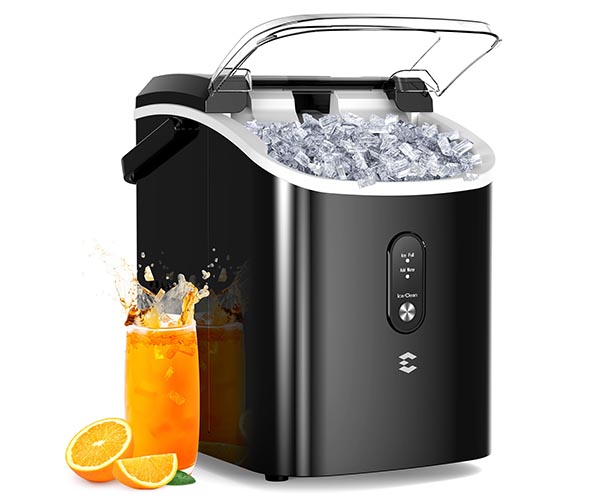
Personal Recommendations and Experiences
When it comes to deep cleaning countertop ice makers, my journey has been quite educational. I’ve experimented with various cleaning methods and learned a lot through trial and error. Here are some anecdotes and insights from my experience, as well as testimonials from other users that might help you keep your ice maker in top shape.
My Cleaning Adventures
One of the first methods I tried was using a vinegar and water solution. This is a popular natural cleaning method that many people swear by. Here’s how it went for me:
- Vinegar and Water: I mixed equal parts of vinegar and water and ran it through the ice maker. The results were impressive! The vinegar helped to dissolve the mineral deposits and eliminate any unpleasant odors. However, the smell of vinegar was quite strong, so I had to run several cycles of clean water to completely rinse it out. This method is effective but requires thorough rinsing.
Next, I experimented with lemon juice and baking soda. This combination is known for its deodorizing properties and mild abrasiveness:
- Lemon Juice and Baking Soda: I sprinkled baking soda on a damp cloth and added a few drops of lemon juice. This mixture did wonders for scrubbing the interior parts of the ice maker. It left a pleasant citrus scent and effectively removed stubborn stains. However, like the vinegar method, it required multiple rinses to ensure no residue was left behind.
Finally, I tried a commercial ice maker cleaner. I opted for Affresh, a highly recommended brand:
- Commercial Cleaner (Affresh): Following the product instructions, I found this method to be the most straightforward and efficient. The cleaner not only removed build-up but also left the ice maker sparkling clean with minimal effort. There was no lingering odor, and the cleaning process was quick.
User Testimonials
I’m not the only one who has had great experiences with these cleaning methods. Here are a few testimonials from other users:
- Jane D. from Texas: “I’ve always used the vinegar and water solution to clean my countertop ice maker. It works great, but the smell can be overwhelming. Recently, I switched to lemon juice and baking soda, and it’s a game-changer! My ice maker smells fresh and clean every time.”
- Mark S. from California: “Commercial cleaners like Affresh are my go-to. They’re convenient and highly effective. I used to spend hours scrubbing my ice maker, but now it’s a breeze. Just follow the instructions, and you’re good to go.”
- Samantha L. from New York: “I prefer natural solutions for cleaning. Vinegar and water are my favorite because they’re safe and environmentally friendly. It takes a bit more effort to rinse out, but it’s worth it for me.”
- Tom H. from Florida: “After trying multiple methods, I settled on using lemon juice and baking soda. It’s affordable and leaves my ice maker smelling amazing. Plus, it’s fun to watch the baking soda fizz when it meets the lemon juice!”
Final Thoughts
Through my experiences and those of others, it’s clear that there are multiple effective methods for deep cleaning countertop ice makers. Whether you prefer natural solutions or commercial cleaners, the key is consistency and thoroughness. Regular maintenance not only ensures the longevity of your ice maker but also guarantees that you always have fresh, clean ice.
Remember, the best cleaning method is the one that fits your needs and lifestyle. Happy cleaning!
FAQs About the Best Cleaning Solutions for Ice Makers
1. Why is it important to regularly clean my countertop ice maker?
Regular cleaning of your countertop ice maker is crucial to prevent the buildup of mold, bacteria, and mineral deposits. These contaminants can affect the taste and safety of the ice, potentially leading to health issues. Moreover, routine maintenance extends the lifespan of your appliance, ensuring it operates efficiently.
2. What are the best natural cleaning solutions for ice makers?
The best natural cleaning solutions for ice makers include a mixture of vinegar and water, and lemon juice combined with baking soda. Vinegar is excellent for dissolving mineral deposits and disinfecting, while lemon juice and baking soda work well for deodorizing and scrubbing stubborn stains.
3. How do I use vinegar to clean my ice maker?
To clean your ice maker with vinegar:
- Unplug the machine and remove any ice.
- Mix equal parts vinegar and water.
- Use the solution to wipe down the interior and removable parts.
- Run a cleaning cycle with the vinegar solution, then rinse thoroughly with clean water to remove any residue.
4. Are commercial cleaning solutions safe for my ice maker?
Yes, commercial cleaning solutions are generally safe for your ice maker when used as directed. Products like Affresh are specifically designed for ice makers and effectively remove build-up and sanitize the appliance. Always follow the manufacturer’s instructions to ensure safe and effective cleaning.
5. How often should I clean my countertop ice maker?
It is recommended to clean your countertop ice maker at least once a month. However, if you use the machine frequently, you may need to clean it more often. Regular maintenance helps prevent the buildup of contaminants and ensures the ice maker functions efficiently.
6. What are the signs that my ice maker needs cleaning?
Signs that your ice maker needs cleaning include:
- Reduced ice production.
- Unpleasant odors coming from the machine.
- Ice cubes with an unusual taste or cloudy appearance.
- Visible mold or mineral deposits inside the machine.
7. Can I use bleach to clean my ice maker?
While bleach is a powerful disinfectant, it is not recommended for cleaning ice makers due to its potential to leave harmful residues and strong odors. Safer alternatives include vinegar, lemon juice, and commercial ice maker cleaners, which are effective and safer for food-related appliances.
8. What are some maintenance tips to keep my ice maker in good condition?
- Clean your ice maker regularly using natural or commercial solutions.
- Empty and dry the ice maker if it won’t be used for an extended period.
- Use filtered water to reduce mineral build-up.
- Check and clean the water filter regularly if your ice maker has one.
- Follow the manufacturer’s maintenance recommendations to ensure optimal performance.
These FAQs should help you understand the best practices for maintaining your countertop ice maker, ensuring it stays clean and functions effectively. Regular cleaning and proper maintenance will keep your ice fresh and your appliance in top condition.
